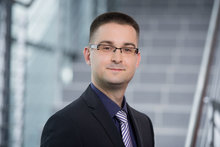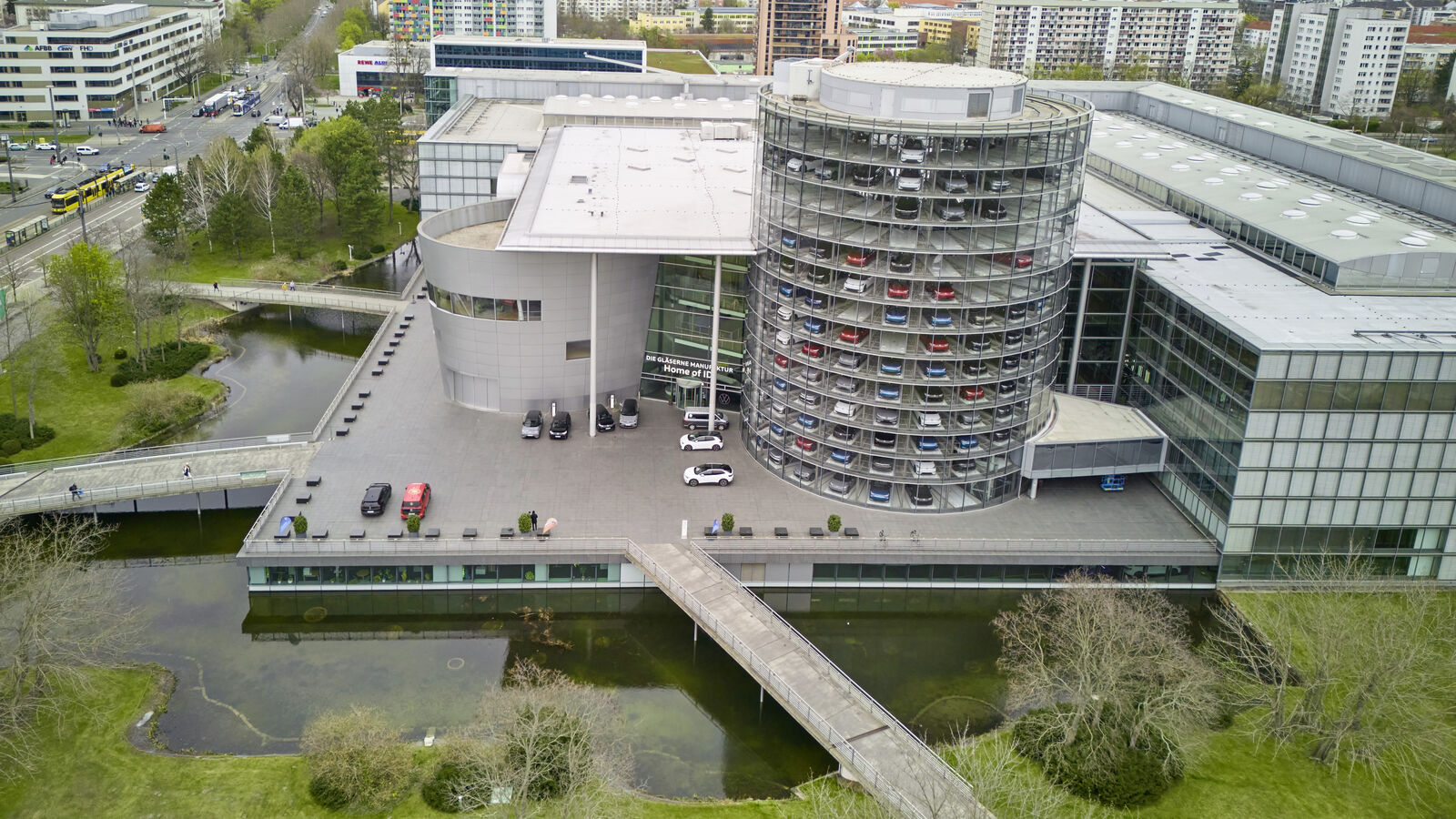| Aerea: | 83.000 m2 |
| Production: | Since January 2021: 22,460 ID.3 , before that: 50,401 e-Golf (2017-2020); 84,235 Phaeton (2001-2016) and 2,186 Bentley Flying Spur (2005/2006 and 2013/2014) |
| Model: | Volkswagen ID.3 |
| Employees: | 320 (incl. dual students & trainees, as at: 12/2024 |
Volkswagen Sachsen GmbH
Gläserne Manufaktur (The Transparent Factory) Dresden
Information for the Press
Current situation
With the start of production of the ID.3 in January 2021 at the Transparent Factory in Dresden, the previous “Center of Future Mobility” has continued to develop into the “Home of ID.” in the last years.
The central goal: to offer customers, visitors and guests a holistic experience of the ID. Family - starting with advice and test drives, a tour of production, co-construction of the ID.3 and modern event formats through to the handover of electric vehicles. A further focus of the strategic reorientation is the expansion into a research and innovation location, which is driving forward innovative projects in small series for later use at large volume locations in the Volkswagen brand.
In Dresden, customers, visitors and guests can find out how the Volkswagen brand is shaping the mobility of the future. On a one-hour tour, they can experience first-hand how the ID.3 is manufactured by Volkswagen. The highlight of the visitor offer is a free test drive (45 minutes) through Dresden with the current ID. models.
Dresden's largest public and partly solar-powered e-mobility station was built directly at the Transparent Factory. It has been in operation since April 2017. Volkswagen Saxony and the state capital of Dresden have also entered into a cooperation agreement. The aim is to develop Dresden into a model city for electromobility and digitalization.
The Transparent Factory has been cooperating with external start-ups in various formats since 2017. Initially, the collaboration took place as part of an incubator program on mobility topics, now in individual projects with a focus on digitalization and AI topics for production and logistics. In addition, the “Future Mobility Campus” was opened in March 2018, where employees, school classes and, above all, dealers receive further education and training.
Production and new business areas
The Volkswagen Phaeton and the Bentley Flying Spur were manufactured in the Transparent Factory for 14 years until March 2016. The realignment for a more flexible manufacturing process for various models was completed. The e-Golf rolled off the production lines from April 2017 to December 2020. This made the Transparent Factory the first Volkswagen brand site to be fully converted to electric mobility. Series production of the ID.3 started in January 2021. As with the start-up of the e-Golf in 2017, production of the ID.3 also started with one shift and 35 vehicles from Monday to Friday. In 2024, 5,500 ID.3s were produced.
In addition to production, new and expanded business areas have been established and developed. Sales, for example, has become increasingly important in recent years. Up to 20 vehicle handovers to customers are possible. In 2024, 2,500 vehicles were handed over to customers, more than 95 per cent of which were partially or fully electrified. The frontrunners are the ID.3 and ID.4 models manufactured in Saxony.
Production 4.0 is also being driven forward in the Transparent Factory. The central idea is the automation and digitalization of complex work steps within assembly and logistics. Specifically, new technologies are developed in the manufactory and then applied on site in real series processes.
World of experience and service for customers
Volkswagen is treading a new path with a world of experience integrated into the Manufaktur. Here, interested parties and customers can find out more about Volkswagen and the topics of e-mobility and digitalization. They can experience car production up close, as the tour goes directly along the assembly line . In 2024, 110,000 visitors visited the Transparent Factory. That was 10 percent more than in the previous year.
The tour formats have been further developed and created with KID.s tours, sustainability tours for school classes and the newly designed offer in simple language. Test drives are also offered in the ID.3, ID.4, ID.5, ID.7 and ID. Buzz. The exclusive Mach-Mit-Fertigungserlebnis on the ID.3 and experience packages in combination with the e-VITRUM restaurant and combined tickets with the Semperoper, the Transport Museum and the city tour were very popular in 2024.
The following models can be collected from the Transparent Factory: ID.3, ID.4, ID.5, ID.7 and ID.7 Tourer. Also the partially electrified models of the Golf, Tiguan, Passat and Tayron as well as all variants of the Touareg.
Environmental protection
In 2018, the brand set itself an ambitious target for reducing environmental impact in production: by 2025, vehicles and component parts are to be built with a total of 45 per cent less environmental impact than in 2010, the reference year of the current environmental program "Think Blue. Factory." environmental program. Volkswagen is thus on the way to a resource-optimized factory at all of the brand's locations.
In 2018, the Transparent Factory became the brand's first location worldwide to produce its vehicles in a CO2 -neutral manner. The power supply is already CO2 -free thanks to Naturstrom®, which saves 3,600 tons of CO2 per year. In addition, the heat supply and the vehicle fleet are also CO2-free.
Responsibility for the environment also includes biodiversity. Environmental protection was already of central importance during the planning of the Transparent Factory: around 56,000 euros were invested in planting 350 trees. Special sodium vapor lamps in the outdoor area operate in the yellow spectral range to protect the insects from the nearby botanical garden. Furthermore, the depth of the building complex was designed in such a way that the groundwater balance remains in equilibrium. The sealed area has been reduced from 6.7 to 4.8 hectares compared to the previous development status of the site. Volkswagen is also specifically committed to biodiversity: Since May 2019, up to twelve bee colonies with á around 50,000 animals have been buzzing around the factory premises at the Great and Botanical Gardens - the apiary is looked after by a factory employee. The honey, around 450 kilograms, is sold in the factory restaurant e-Vitrum.
Social and cultural commitment
The Transparent Factory is not just a production facility and employer. With its location in the center of Dresden, it is part of the social and cultural life of the city and therefore also bears responsibility for the future of the region. The Transparent Factory wants to make life with electromobility accessible to visitors and help shape the automotive future of the city of Dresden with new mobility concepts and offers. The fact that the Transparent Factory also fulfils its responsibility to the people of the region is reflected in the promotion and support of numerous projects and activities dedicated to social welfare and cultural development.
The employees set a sustainable example with the leftover cent campaign, for example. For more than 17 years, they have been donating the cents left after the decimal point on their pay slips every month. The Transparent Factory uses the proceeds to support the Dresden support organization for children and young people with cancer - Sonnenstrahl e.V. Another annual employee campaign is the support and participation in charity runs for UNICEF Dresden. Volkswagen also promotes cultural education and development through regional cultural projects and partnerships. The commitment ranges from a long-term partnership with the Sächsische Staatskapelle Dresden and the Semperoper.
Plant Manager
Dr. Martin Goede comes from Hanover and joined the Volkswagen Group in 2002. Since then, the mechanical engineering graduate has worked in the Production & Logistics department. Over the past three years, he has focused on the design of future factory concepts and the production of the future at the Volkswagen Passenger Cars brand. Prior to that, he had been Head of Technology Planning and Development since 2011.
About Volkswagen Sachsen GmbH
The founding of Volkswagen Sachsen GmbH in December 1990 marked the start of Volkswagen AG's ambitious project to establish a competitive production facility for Volkswagen vehicles and engines in one of Germany's most traditional automobile manufacturing regions. In addition to the temporary use of existing facilities at the Zwickau and Chemnitz sites, which were completely modernized by Volkswagen, two new production facilities for vehicle and engine construction were built. The Transparent Factory Dresden was opened in 2001. In 2014, Automobilmanufaktur Dresden GmbH merged with Volkswagen Sachsen GmbH.
Since then, Volkswagen Sachsen GmbH has included the Zwickau vehicle plant, the Chemnitz engine plant and the Transparent Factory in Dresden. Volkswagen Sachsen GmbH employs 11,500 people (including Volkswagen Training Institute). Around 98 per cent of the workforce have completed specialist vocational training or have a master craftsman, university or university degree. The average age is around 45 years and the proportion of women is currently 12.7 percent.
Danny Auerswald is Chairman of the Board of Management of Volkswagen Sachsen GmbH and is responsible for the Technology and Logistics divisions. Prof. Thomas Edig (Human Resources and Organisation) and Lukas Folc (Finance and Controlling) are members of the Management Board.
Media contact





